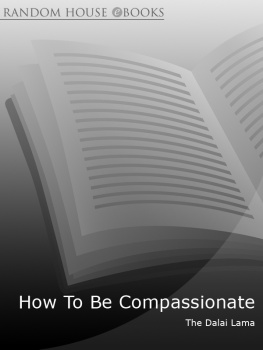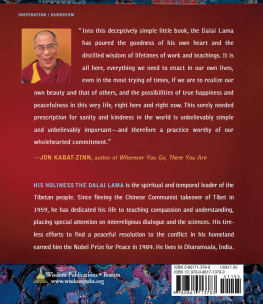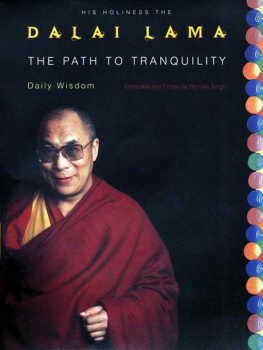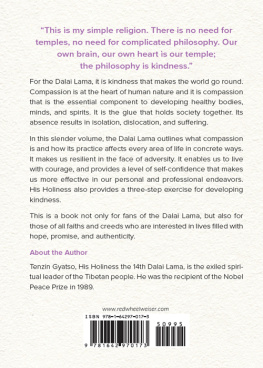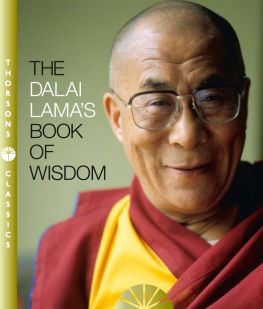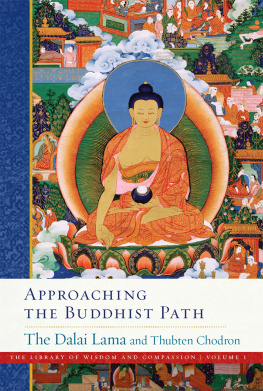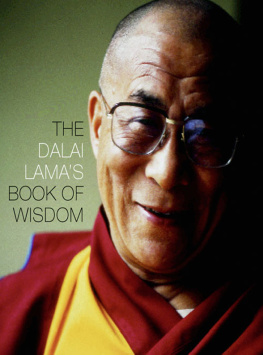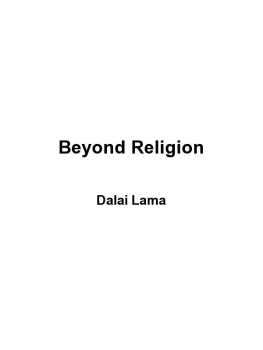
Copyright The Dalai Lama Foundation 2018, 2019
All rights reserved. No part of this publication may be
reproduced or transmitted in any form or by any means,
electronic or mechanical, including photocopying, recording,
or by any information storage and retrieval system, without
permission in writing from Hampton Roads Publishing, Inc.
Reviewers may quote brief passages.
First published in 2018 as Happiness by Penguin Books,
Penguin Random House India. ISBN 9780143442998
Hampton Roads Publishing Company, Inc.
Charlottesville, VA 22906
Distributed by Red Wheel/Weiser, LLC
www.redwheelweiser.com
Cover and text design by Kathryn Sky-Peck
Graphic image of the Dalai Lama from www.vectorportal.com
ISBN: 978-1-64297-003-6
Library of Congress Cataloging-in-Publication Data
available on request.
Printed in Canada
FR
10 9 8 7 6 5 4 3 2 1
www.redwheelweiser.com/newsletter

Publisher's note:
Everyone wants to be happy. However, just the wanting of that happiness can cause us so much suffering. What is happiness? Where do we find it? Is it something we create or something we deserve? How do we go about achieving it?
This little volume is a road map for discovering your path to happiness, joy, and a sense of purpose. The Dalai Lama teaches that each of us is responsible for our own happiness and that happiness is always within our reachboth individually and collectively.
In this intimate discussion, with his characteristic wisdom, humor, and kindness, His Holiness the Dalai Lama breaks down what it means to be happy and shows us that how we think, behave, and sensually experience the world ultimately impacts how we experienceand createhappiness.
In this little book, His Holiness the Dalai Lama tells us: Be happy.
Just be.
Herein are the keys to being happy. If you desire to attain happiness, you must understand that the journey begins with you. It is only then that you can reach out and touch the lives of others and change society.

With his characteristic down-to-earth approach to the Buddhist path, His Holiness the Dalai Lama has often observed of himself that his informal speaking style complements my broken English. This volume has been edited to keep alive his voice and its unique flavor.
Contents
HAPPINESS
D ear brothers and sisters, I am very happy to have this opportunity to talk to you. Whenever I give a talk, I always have this feeling that we human beings are all the samementally, emotionally, and physically.
Everyone wants a happy life. Nobody wakes up in the morning wishing for more trouble that day. However, emotional trouble is essentially our own creation.
EMOTIONAL TROUBLE
UNHAPPINESS
IS ESSENTIALLY
OUR OWN CREATION.
I think this is largely due to two things: The first reason is our lack of knowledge of reality (essentially because we are absent a holistic view); the second reason is a self-centered attitude.
These two thingslack of knowledge and a self-centered attitudecreate unnecessary problems.
We can't blame our problems on anybody or anything else. Ultimately, we have to realize that the cause of these problems lies within ourselves.
So how do we deal with them?
We deal with them not through prayer, not through money, not through power, but through understanding and awarenesswhat we may call wisdom.
Happiness. Everyone, including animals, wants less mental disturbance. But before talking about the source of happiness, it might be useful to know something about the system of our minds.
Happiness, which we may think of as just an emotion, is a product of our minds. Usually people are under the impression that the mind is independent, absolute.
LACK OF KNOWLEDGE AND
A SELF-CENTERED ATTITUDE
CREATE UNNECESSARY
PROBLEMS.
HAPPINESS,
WHICH WE MAY THINK OF AS
JUST AN EMOTION,
IS A PRODUCT OF
OUR MINDS.
Science, too, is not yet clear about the distinction between the sensorial mind and consciousness. It is important to make that distinction.
When people seek pleasurable experiences, they rely mainly on the sensorial level to attain that pleasurewatching something beautiful, listening to music, tasting or smelling something. This includes tactile pleasures, including sex. And just like pleasure, pain is also part of our experiences.
Positive experiences are mainly registered at the sensorial level; they are the products of our five senses. But these sensorial experiences are temporary. The object of beauty you behold or the beautiful music you hear is gone the moment you stop seeing or hearing it.
In contrast, if you develop your pleasurable, positive experiences at a mental level, the experience of pleasure lasts longer.
You can experience a feeling of calm through your five sensesby being in a calming environment for example. Or you can experience a feeling of calm in your mind. So a disturbing noise at the sensorial level will not affect this basic calmness. Even the pain of physical illness can be subdued in this state.
HAPPINESS IS A
SENSE OF FULFILLMENT
AT THE MENTAL LEVEL
OF CONSCIOUSNESS.
On the other hand, no sensorial pleasure can be had if the basic mental state is one of fear, anxiety, and stress.
Obviously, mental-level experiences are more important than sensorial ones.
It is important to understand that mental-level happiness need not be about pleasure. It's about mental satisfaction or fulfilment.
MENTAL-LEVEL HAPPINESS
NEED NOT BE
ABOUT PLEASURE.
Even physical suffering and pain can bring deep satisfaction at the mental level.
Happiness mainly refers to this feeling at the level of consciousness.
All major religious traditions try to bring about calmness, peacefulness, and positivity at the mental level. Faith is not at the sensorial level. It is the sixth consciousness.
Of course, the sensorial level helps in attaining mental satisfaction; for example, seeing the image of the Buddha or a god or listening to prayers.
However, the real effect is due to faith. The practice of love and compassionand with them, forgiveness, tolerance, and contentmentoperates at the level of mental consciousness.
Cause and Effect
There are nontheistic religious traditionssuch as Sankhya, a 3,000-year-old Indian tradition, as well as Jainism and Buddhismthat do not talk about a creator but believe instead in the law of causality, or the law of cause and effect.
Everybody in this country is familiar with the concept of karma: cause and effect. It means action.
Any actionwhether physical, verbal, or mentalarising out of any positive emotion or sincere motivation, like compassion and forgiveness, is positive or good karma.
ANY ACTION
ARISING OUT OF
POSITIVE EMOTION
IS GOOD KARMA.
When the motivation is good, when there's a sense of concern for others' well-being, when an action benefits others as well as oneself, then the action is considered positive. Otherwise, there's no absolute positive or negative.
For example, anger, hatred, and suspicion are considered negative. But suspicion may be positive or negative, since suspicion leads us to action.
Next page

